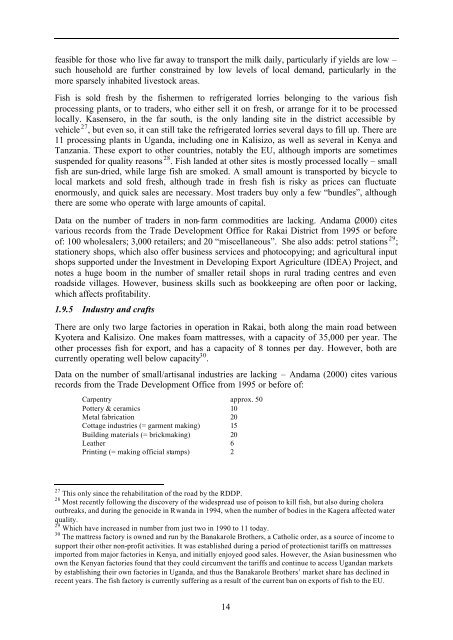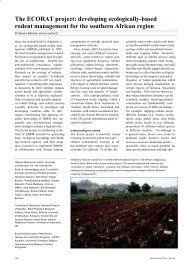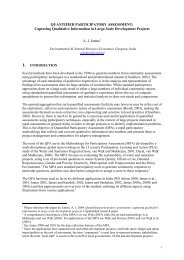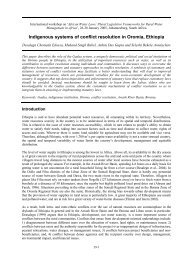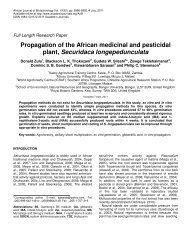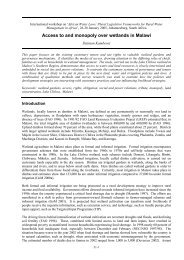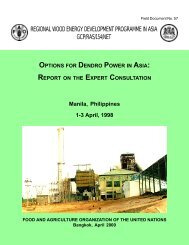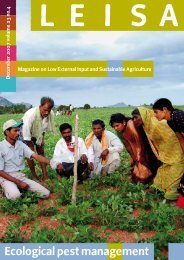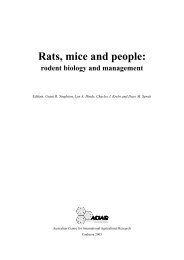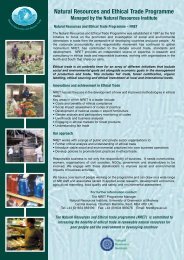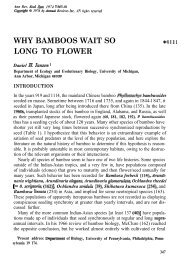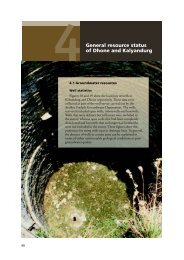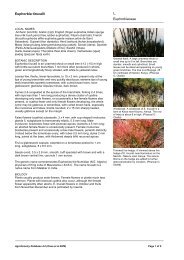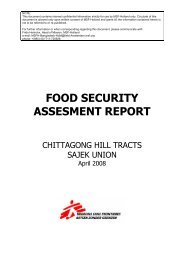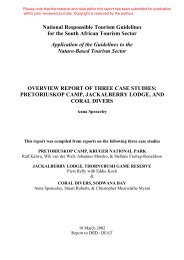Access to Rural Non-Farm Livelihoods - Natural Resources Institute
Access to Rural Non-Farm Livelihoods - Natural Resources Institute
Access to Rural Non-Farm Livelihoods - Natural Resources Institute
You also want an ePaper? Increase the reach of your titles
YUMPU automatically turns print PDFs into web optimized ePapers that Google loves.
feasible for those who live far away <strong>to</strong> transport the milk daily, particularly if yields are low –<br />
such household are further constrained by low levels of local demand, particularly in the<br />
more sparsely inhabited lives<strong>to</strong>ck areas.<br />
Fish is sold fresh by the fishermen <strong>to</strong> refrigerated lorries belonging <strong>to</strong> the various fish<br />
processing plants, or <strong>to</strong> traders, who either sell it on fresh, or arrange for it <strong>to</strong> be processed<br />
locally. Kasensero, in the far south, is the only landing site in the district accessible by<br />
vehicle 27 , but even so, it can still take the refrigerated lorries several days <strong>to</strong> fill up. There are<br />
11 processing plants in Uganda, including one in Kalisizo, as well as several in Kenya and<br />
Tanzania. These export <strong>to</strong> other countries, notably the EU, although imports are sometimes<br />
suspended for quality reasons 28 . Fish landed at other sites is mostly processed locally – small<br />
fish are sun-dried, while large fish are smoked. A small amount is transported by bicycle <strong>to</strong><br />
local markets and sold fresh, although trade in fresh fish is risky as prices can fluctuate<br />
enormously, and quick sales are necessary. Most traders buy only a few “bundles”, although<br />
there are some who operate with large amounts of capital.<br />
Data on the number of traders in non-farm commodities are lacking. Andama (2000) cites<br />
various records from the Trade Development Office for Rakai District from 1995 or before<br />
of: 100 wholesalers; 3,000 retailers; and 20 “miscellaneous”. She also adds: petrol stations 29 ;<br />
stationery shops, which also offer business services and pho<strong>to</strong>copying; and agricultural input<br />
shops supported under the Investment in Developing Export Agriculture (IDEA) Project, and<br />
notes a huge boom in the number of smaller retail shops in rural trading centres and even<br />
roadside villages. However, business skills such as bookkeeping are often poor or lacking,<br />
which affects profitability.<br />
1.9.5 Industry and crafts<br />
There are only two large fac<strong>to</strong>ries in operation in Rakai, both along the main road between<br />
Kyotera and Kalisizo. One makes foam mattresses, with a capacity of 35,000 per year. The<br />
other processes fish for export, and has a capacity of 8 <strong>to</strong>nnes per day. However, both are<br />
currently operating well below capacity 30 .<br />
Data on the number of small/artisanal industries are lacking – Andama (2000) cites various<br />
records from the Trade Development Office from 1995 or before of:<br />
Carpentry approx. 50<br />
Pottery & ceramics 10<br />
Metal fabrication 20<br />
Cottage industries (= garment making) 15<br />
Building materials (= brickmaking) 20<br />
Leather 6<br />
Printing (= making official stamps) 2<br />
27 This only since the rehabilitation of the road by the RDDP.<br />
28 Most recently following the discovery of the widespread use of poison <strong>to</strong> kill fish, but also during cholera<br />
outbreaks, and during the genocide in Rwanda in 1994, when the number of bodies in the Kagera affected water<br />
quality.<br />
29 Which have increased in number from just two in 1990 <strong>to</strong> 11 <strong>to</strong>day.<br />
30 The mattress fac<strong>to</strong>ry is owned and run by the Banakarole Brothers, a Catholic order, as a source of income <strong>to</strong><br />
support their other non-profit activities. It was established during a period of protectionist tariffs on mattresses<br />
imported from major fac<strong>to</strong>ries in Kenya, and initially enjoyed good sales. However, the Asian businessmen who<br />
own the Kenyan fac<strong>to</strong>ries found that they could circumvent the tariffs and continue <strong>to</strong> access Ugandan markets<br />
by establishing their own fac<strong>to</strong>ries in Uganda, and thus the Banakarole Brothers’ market share has declined in<br />
recent years. The fish fac<strong>to</strong>ry is currently suffering as a result of the current ban on exports of fish <strong>to</strong> the EU.<br />
14


